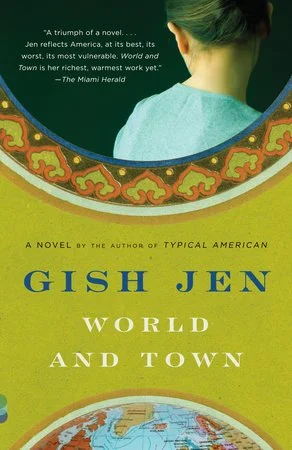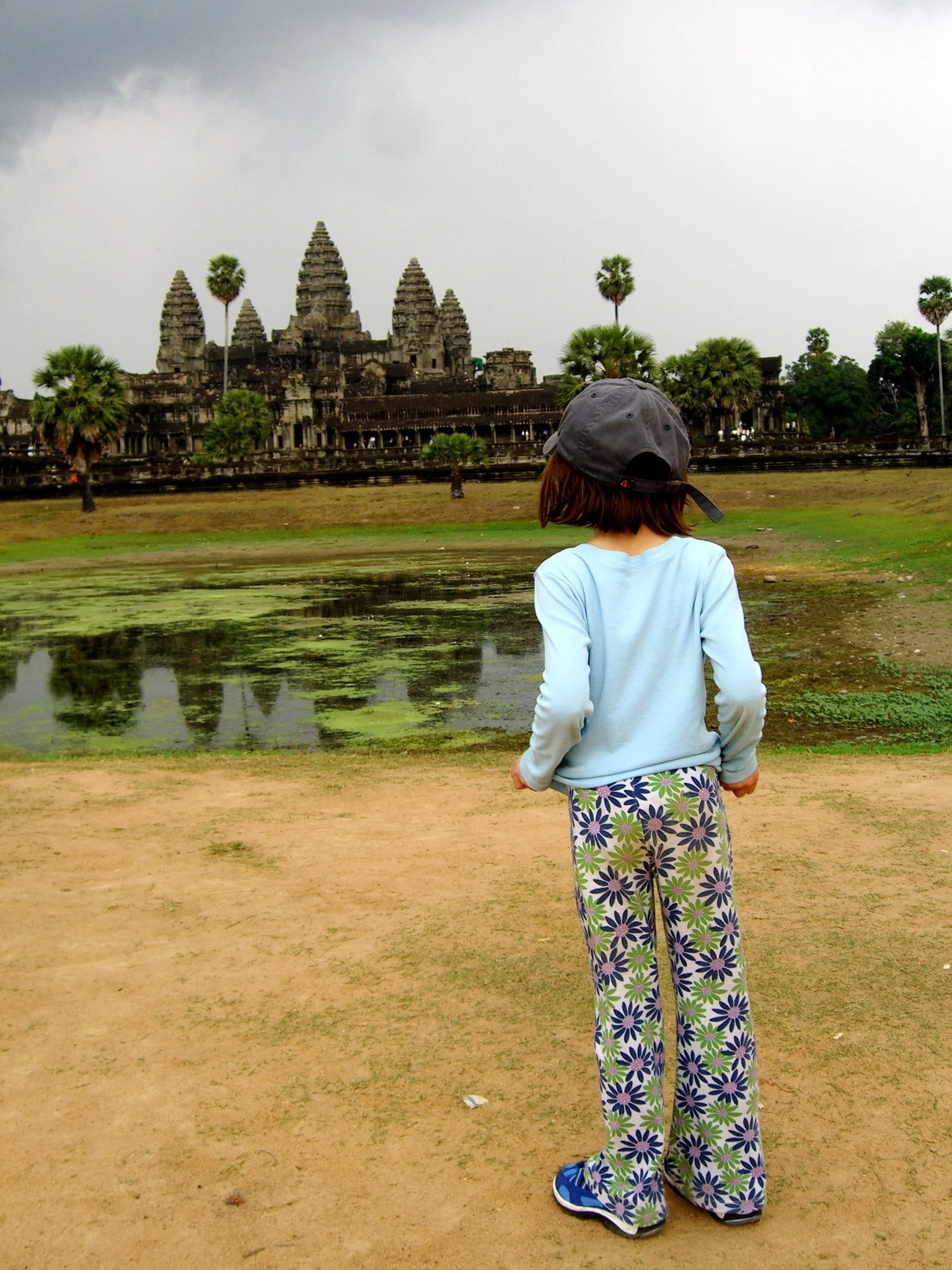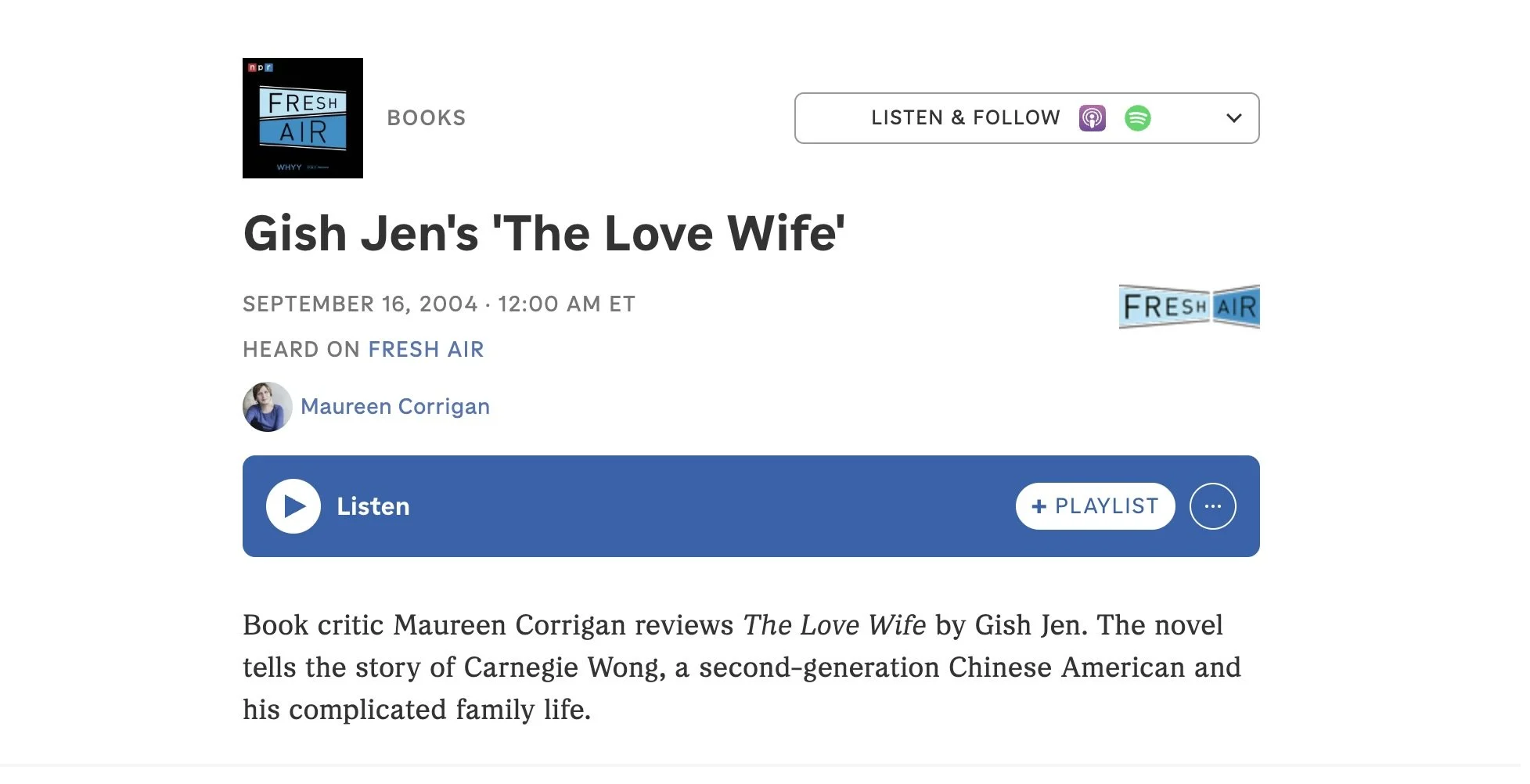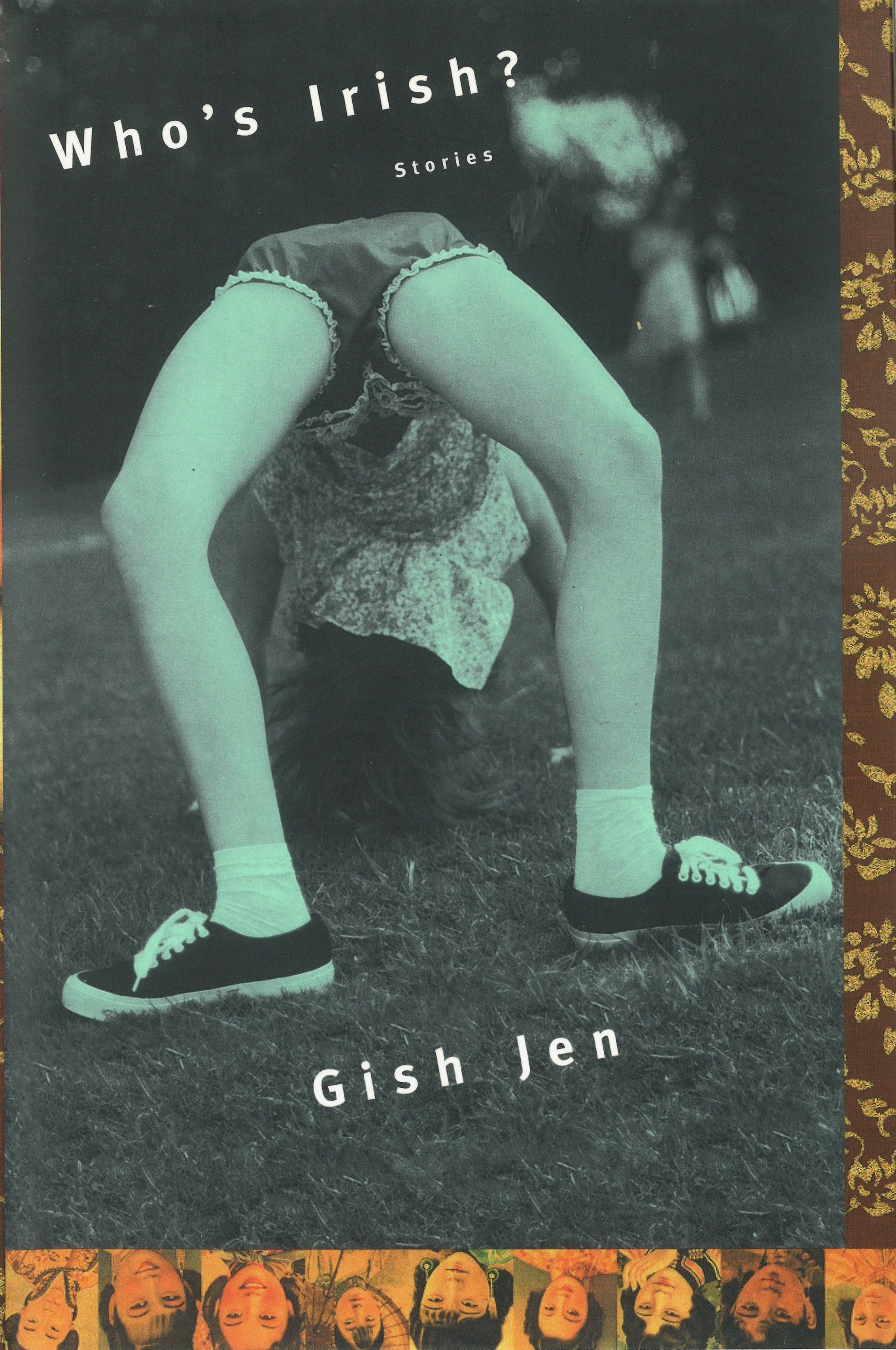A provocative and important study of the different ideas Easterners and Westerners have about the self and society and what this means for current debates in art, education, geopolitics, and business.
IndieBound
Amazon
“Timely and extremely important.” — The Washington Post
PRAISE
A deep psychological study of how place, habits, and identity mix in our world. Tremendous! – Yo Yo Ma
Subtle, erudite, and daring, The Girl at the Baggage Claim is a tour de force by one of the most insightful writers of our time. – Amy Chua
Insightful, far-reaching and a joy to read, Gish Jen takes on the mystery of cultural difference, and succeeds in cracking the code. The Girl at the Baggage Claim answers questions I’ve been asking my whole life. – David Henry Hwang
In her trademark lively and witty prose, Gish Jen not only limns non-Western views of the self but questions whether the Western self is really a natural way to be. A powerful, provocative work. – Michael Puett, Harvard University
Science has revealed how our senses filter the world around us—making us focus on visual boundaries, musical repetition, and musky odors. With her novelist’s insights, Gish Jen shows us how differences in culture can filter our world as well. The Girl at the Baggage Claim is truly eye-opening and thought-provoking. – Eric Lander, the Broad Institute of MIT and Harvard University
Misunderstanding East-West differences can cost us in every way we know how to measure: in money, friendship, education, in the balance of power, and the fate of the planet. The Girl at the Baggage Claim is remarkable and fluent but, most of all, essential. – Sherry Turkle
A beautifully observed book with a perfect, light tone, The Girl at the Baggage Claim poignantly captures the personal tussle between independence and interdependence so many of us are caught in. A must read for anyone navigating the East-West divide. – Priya Natarajan, Yale University
This book gives special proof to the belief that our best novelists are also our best psychologists. With characteristic wit and unfailing insight, Gish Jen creates a genre all her own—uniquely universal, deeply serious, and unselfconsciously joyous. – Maryanne Wolf, UCLA
ABOUT THE BOOK
A provocative and important study of the different ideas Easterners and Westerners have about the self and society and what this means for current debates in art, education, geopolitics, and business.
Never have East and West come as close as they are today, yet we are still baffled by one another. Is our mantra “To thine own self be true”? Or do we believe we belong to something larger than ourselves—a family, a religion, a troop—that claims our first allegiance? Gish Jen—drawing on a treasure trove of stories and cutting-edge research—reveals how this difference shapes what we perceive and remember, what we say and do and make—indeed, how it shapes everything from our ideas about copying and talking in class to the difference between Apple and Alibaba.
As engaging as it is illuminating, this is a book that stands to profoundly enrich our understanding of ourselves and of our world.
MEDIA
Drawing on a rich array of sources, from paintings to behavioral studies to her father’s striking account of his childhood in China, this accessible book not only illuminates Jen’s own development and celebrated work but also explores the aesthetic and psychic roots of the independent and interdependent self—each mode of selfhood yielding a distinct way of observing, remembering, and narrating the world.
IndieBound
Amazon
“A magnificent feat of integration” — Maxine Hong Kingston
PRAISE
“A profound meditation on the divergent roles that storytelling, artmaking, and selfhood take on across the East–West divide. Penetrating, inspired, and, yes, indispensable.”
– Junot Diaz
“A magnificent feat of integration … I am proud, proud, proud to share ancestors—and the novel and the world—with Gish Jen.”
– Maxine Hong Kingston
“Tiger Writing is both precise and intimate, a terrific contribution to our understanding of the artist’s lot in the East and in the West”.
– Gary Shteyngart
“How to balance the competing claims of social order and self-determination? It’s a question that all novelists must grapple with, and Jen, drawing on extensive research in the social sciences as well as her own vividly-rendered biography, gives us an entirely new answer. The result is a strikingly original —and compellingly personal—account of the novel as a genre.”
– Amanda Claybaugh, Harvard University
Blending family memoir, cultural criticism, and reflections on her own life as a writer, Gish Jen makes a compelling case for the novel as a meeting-ground of typically American themes of independence with classically Asian ideals of interdependence. Tiger Writing is a rare case of a book on writing that itself is a joy to read.
– David Damrosch, Harvard University
ABOUT THE BOOK
For author Gish Jen, the daughter of Chinese immigrants, books began as an Outsider’s Guide to the Universe. Through her eclectic childhood reading, though, Jen stumbled onto a cultural phenomenon that would fuel her writing for decades to come: the profound difference in self-narration that underlies the East-West culture gap.
Drawing on a rich array of sources, from paintings to studies to her father’s astonishing account of his childhood in China, this accessible book illuminates Jen’s own development and celebrated work. But it also explores the aesthetic and psychic roots of the independent and interdependent self—each mode of selfhood yielding a distinct way of observing, remembering, and narrating the world.
In its progress from a moving evocation of one writer’s life to a convincing delineation of the forces that have shaped our experience for millennia, Tiger Writing radically shifts the way we understand ourselves and our art-making.
In this thick, satisfying sprawl of a read… Jen gracefully introduces some of the great issues of our time: how the shock of 9/11 reverberated from city to town; how lost souls can cling meanly to fundamentalism; how it feels when a chain store bulldozes into a mom-and-pop community, or a family farm finally collapses.
IndieBound
Amazon
“It’s a big subject, America, but Gish Jen once again proves an exemplary national pulse-taker” — Toronto Star
Winner, 2011 Massachusetts Book Prize
Nominee, International IMPAC Dublin Literary Award
PRAISE
“What a pleasure to read this smart, warm novel from Gish Jen… Jen knows how to create thoughtful characters who can talk and think about complex issues without making us take notes.” – Ron Charles, Washington Post
In this thick, satisfying sprawl of a read, Jen gracefully introduces some of the great issues of our time: how the shock of 9/11 reverberated from city to town; how lost souls can cling meanly to fundamentalism; how it feels when a chain store bulldozes into a mom-and-pop community, or a family farm finally collapses. – Entertainment Weekly
Sharply funny and wisely compassionate, Jen’s richly stippled novel slyly questions every assumption about existence and meaning even as it celebrates generosity, friendship, and love. – Donna Seaman, Booklist
ABOUT THE BOOK
Hattie Kong—the spirited offspring of a descendant of Confucius and an American missionary to China—has, in her fiftieth year of living in the United States, lost both her husband and her best friend to cancer. It is an utterly devastating loss, and also heartbreakingly absurd: a little, she thinks, “like having twins. She got to book the same church with the same pianist for both funerals and did think she should have gotten some sort of twofer from the crematorium.”
But now, two years later, it is time for Hattie to start over. She moves to the town of Riverlake, where she is soon joined by an immigrant Cambodian family on the run from their inner-city troubles, as well as a just-retired neuroscientist ex-lover. All of them are, like Hattie, looking for a new start in a town that might once have represented the rock-solid base of American life but that is itself now challenged by cell-phone towers and chain stores, struggling family farms and fundamentalist Christians.
What Hattie makes of this situation is at the center of a novel that asks deep and absorbing questions about religion, home, America, what neighbors are, what love is, and, in the largest sense, what “worlds” we make of the world.
Doing research in Cambodia with family
Rich in insight, buoyed by humor, The Love Wife is a witty, sharp-eyed, compassionate, and a hugely satisfying work.
IndieBound
Amazon
“A big story about families and identity and race and the American Dream. . . her most ambitious and emotionally ample work yet.” — Michiko Kakutani
PRAISE
The Love Wife shares all the wonderful attributes of Jen’s other books but is deeper, richer, darker, far more complex and mature. . . by far the most satisfying and enjoyable novel I have read this year. – Susan Miron, The Miami Herald
Gish Jen’s characters are so alive that one can hardly call them ‘characters.’ Blondie, Mama Wong, Carnegie, Lizzy, Wendy, and, oh, Lan! Here it a novel so insightful, so satisfying, that it ought never to have ended. The ingenuity of the narration, the tenderness, the all-observing comedy, the darker elements, the pitch-perfect dialogue, the domestic exactitude, the surprises! Having lived for a time (too brief a time) with Gish Jen’s people as with one’s own family, one comes to love them. — Cynthia Ozick
It’s hard to find a novel that seems, at once, so funny and so touching that one really is dumbstruck with admiration. I read the book in three sittings and plan to start it all over again soon. – Jay Parini
What a truly satisfying read. As I got to know the Wongs—a family like more and more American families—I loved each one of them. Hearing their multilingual voices and participating in their delights and sadnesses, their fun and troubles, I felt my own understanding and kindness grow. A wonderful book. — Maxine Hong Kingston
ABOUT THE BOOK
The Wongs describe themselves as a “half half” family, but the actual fractions are more complicated, given Carnegie’s Chinese heritage, his wife Blondie’s WASP background, and the various ethnic permutations of their adopted and biological children.
Into this new American family comes a volatile new member. Lanlan is Carnegie’s Mainland Chinese relative, a tough, surprisingly lovely survivor of the Cultural Revolution, who comes courtesy of Carnegie’s mother’s will. Is Lanlan a very good nanny, a heartless climber, or a posthumous gift from a formidable mother who never stopped wanting her son to marry a nice Chinese girl?
What happens as Carnegie and Blondie try to incorporate the ambiguous new arrival into their already complicated family is touchingly, brilliantly, intricately told. Rich in insight, buoyed by humor, The Love Wife is a witty, sharp-eyed, compassionate, and hugely satisfying work.
In eight wonderfully alive stories, Jen chronicles Chinese and other Americans as they exuberantly win, lose, love, hate, overachieve, underachieve, and generally take on America—with sometimes comic, sometimes heartbreaking results.
IndieBound
Amazon
“The product of a true craftswoman whose gifts transcend all cultural and ethnic labels.” — USA Today
PRAISE
Jen’s performance isn’t a series of one-liners, but an elaborate balancing act: Chinese and American, painful and funny…The result: an esthetic whole even greater than the sum of its entertaining parts.” – David Gates, Newsweek
Her subject matter is so appealing, it almost obscures the power and suppleness of her language… Jen finds words for all the high and low notes of the raucous American anthem. – Jean Thompson, New York Times Book Review
Gish Jen’s stories are keenly observed moments in time, in which the characters’ foibles predominate just long enough for an odd equilibrium to be established between their yearning and their movement toward small, unexpected moments of grace. In many of the stories, the characters seem to be trying their lives on for size: discomfiting to observe, though at the time, offering readers a sadness convincingly tinged with humor. – Ann Beattie
ABOUT THE BOOK
In eight wonderfully alive stories, Jen chronicles Chinese and other Americans as they exuberantly win, lose, love, hate, overachieve, underachieve, and generally take on America—with sometimes comic, sometimes heartbreaking results.
Life not is not what it was a generation ago, but it is any easier? A Chinese-American woman attempts to discipline her Chinese-Irish-American grandchild, only to come up against her daughter’s state-of-the-art parenting. A grown man flees to China to escape his disapproving mother, “who called him everyday lest he forget she was not speaking to him.” A computer expert accidentally books himself into a welfare hotel.
The stories in Who’s Irish? prove once again that Gish Jen is an essential writer for our time—a writer who moves and entertains us as she updates the American Dream.
A young relative and his reading buddy
It is 1968, the dawn of the age of ethnicity: African Americans are turning Chinese, Jews are turning black, and though some nice Chinese girls are turning more Chinese, teenaged Mona Chang is turning Jewish, much to her parents’ chagrin.
IndieBound
Amazon
“Name a book that made me laugh out loud? Gish Jen’s Mona in the Promised Land!”—Margaret Atwood
PRAISE
We might want to run Gish Jen for President… This brilliant writer fractures the melting pot and re-sets the literary table right before our very eyes.– Jayne Anne Phillips
What I love about this story is that while it is written in the nineties by an American woman, the author seems to relish every politically incorrect moment …a warm and witty exploration of racial and religious divides. – Literary Review
What a good laughing out loud book this is. – Grace Paley
A light-hearted novel of radiant charm and human warmth, Gish Jen’s funny, headlong, and completely delightful narrative of high-achieving Chinese and Jewish suburbanites is indelibly American and could unfold nowhere else. – Cynthia Ozick
Can a novel be both hilariously funny and seriously important? Yes, in the case of Mona in the Promised Land. – Amy Tan
ABOUT THE BOOK
It is 1968, the dawn of the age of ethnicity: African Americans are turning Chinese, Jews are turning black, and though some nice Chinese girls are turning more Chinese, teenaged Mona Chang is turning Jewish, much to her parents’ chagrin.
The Chang family has just moved to posh Scarshill, New York, where the rhododendrons are as big as the Chang family’s old bathroom. This takes some getting used to, especially since there’s also a new social landscape, with a hot line, a mystery caller, and a Temple Youth Group full of radical ideas.
Mona quickly bleaches her bell-bottoms. Then it’s off with her friends to reform race relations. They find a cause in Alfred, the handsome black number-two cook at Mona’s parents’ pancake house, and pretty soon there is a mansion hideout with an underground railroad and a utopia called Camp Gugelstein.
Certain love affairs run into trouble, though. And by their end, for better or for worse, unforeseen truths of contemporary American have been memorably revealed.
Gish at Scarsdale High School, late 1960s.
Gish Jen reinvents the American immigrant story through the Chang family, who come to the United States with no intention of staying.
IndieBound
Amazon
“Gish Jen has secured her place in American literature with this touching tale.”—San Francisco Chronicle
PRAISE
Nominated for a National Book Critics’ Circle Award
No paraphrase could capture the intelligence of Gish Jen’s prose, its epigrammatic sweep and swiftness . . . The author just keeps coming at you line after stunning line. – A. G. Mojtabai, New York Times Book Review
The brilliance of Gish Jen’s novel is that it operates so deeply, yet so entertainingly, and at so many levels at once . . . She has created that rarest achievement in literature, the profoundly comic novel. – Bruce Dexter, The San Diego Union
Gish Jen has done more than tell an immigrant story…She has done it more and in some ways better than it has ever been done before. – Richard Eder, Los Angeles Book Review
Gish Jen’s immensely intelligent, thunderously funny, truly heartbreaking novel is perhaps the best story of contemporary immigrant experience ever to grace our literature. – Jayne Anne Phillips
ABOUT THE BOOK
Gish Jen reinvents the American immigrant story through the Chang family, who come to the United States with no intention of staying. When the Communists assume control of China in 1949, though, Ralph Chang, his sister Theresa, and his wife Helen, find themselves in a crisis.
At first, they cling to their old-world ideas of themselves. But as they begin to dream the American dream of self-invention, they move poignantly and ironically from people who disparage all that is “typical American” to people who might be seen as typically American themselves.
With droll humor and a deep empathy for her characters, Gish Jen creates here a superbly engrossing story that resonates with wit and wisdom even as it challenges the reader to reconsider what a typical American might be today.
Gish with perm, circa 1991


















